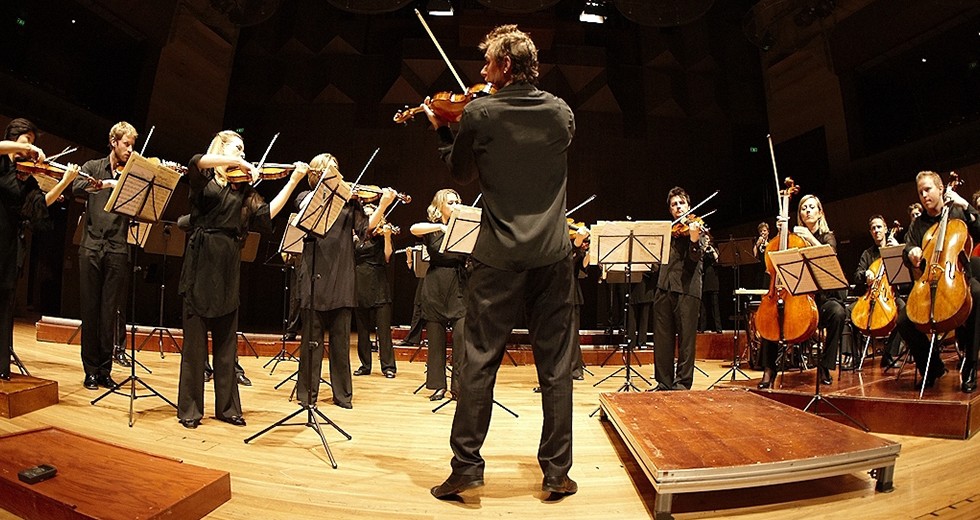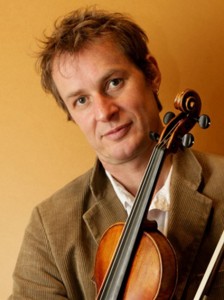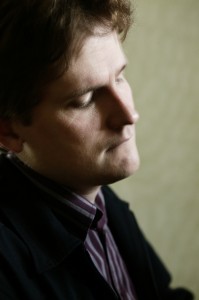
Australia might not have the vaunted classical-music pedigree of, say, Italy or Austria, but the island nation can nonetheless lay claim to some significant ensembles and artists in the field.
Among them is the Australian Chamber Orchestra, an 18-member ensemble that has undertaken more than 50 international tours and gained wide acclaim for its energetic, engaged performance style and inventive, out-of-the-ordinary programming.
 As it approaches its 40th anniversary next year, the ensemble has become a respected classical institution. And that means the group has to work even harder, said Richard Tognetti (at right), who is marking his 25th year as the group’s artistic director and lead violinist. “With a certain amount of establishment ‘cred,’ ” Tognetti said in an e-mail interview, “comes an even greater responsibility to maintain a creative edge in performance and programming, especially when audiences come to expect it.”
As it approaches its 40th anniversary next year, the ensemble has become a respected classical institution. And that means the group has to work even harder, said Richard Tognetti (at right), who is marking his 25th year as the group’s artistic director and lead violinist. “With a certain amount of establishment ‘cred,’ ” Tognetti said in an e-mail interview, “comes an even greater responsibility to maintain a creative edge in performance and programming, especially when audiences come to expect it.”
The chamber orchestra will make its second Orchestra Hall appearance March 23 in a Symphony Center Presents program that anticipates the Chicago Symphony Orchestra’s upcoming Truth to Power festival in May and June. The three-week event will showcase the music of Benjamin Britten, Sergei Prokofiev and Dmitri Shostakovich, who created some of their greatest works during the darkest days of the 1930s and ‘40s, all the while believing in the power of music to inspire hope.
Featured on the March 23 program will be less frequently heard works, including Britten’s Variations on a Theme of Frank Bridge, Prokofiev’s suite from Visions fugitives and Shostakovich’s Two Pieces for String Octet, Op. 11. In addition, noted Finnish pianist Olli Mustonen (below left), who first performed with the chamber orchestra in 1993 and has toured with the group several times since, will be the soloist in Shostakovich’s Piano Concerto No. 1.
As Australia’s only national orchestra, the ensemble regularly visits all the country’s capital cities and has amassed a national subscriber base of more than 9,000 patrons. It also began a countrywide education program in 2005, which includes mentoring top young players. At the same time, the ensemble travels frequently to North America, Europe and beyond.
 Because of its isolation from the world’s major musical centers, such tours have elevated the group’s visibility and gained it considerable international respect. “We’re in the very fortunate position that the demand for us to tour has increased even more in recent years,” Tognetti said. “Touring is really the lifeblood of an orchestra such as the ACO and is essential for us to remain vital and viable.”
Because of its isolation from the world’s major musical centers, such tours have elevated the group’s visibility and gained it considerable international respect. “We’re in the very fortunate position that the demand for us to tour has increased even more in recent years,” Tognetti said. “Touring is really the lifeblood of an orchestra such as the ACO and is essential for us to remain vital and viable.”
In addition to its unusually involving, all-out approach to music-making, the group is known for its commissioning project, which has produced more than 60 works, including Brenton Broadstock’s Never Truly Lost (2013). Set to receive its debut this summer is Water by Jonny Greenwood, a member of British rock group Radiohead.
One of the orchestra’s biggest new-music successes has been Latvian composer Pēteris Vasks’ Vox Amoris, which it premiered on a national tour in 2009. The group has subsequently performed the piece all over the world, including Vienna’s Musikverein and the Tanglewood Music Festival in Massachusetts; other ensembles, including the St. Paul Chamber Orchestra, have added it to their repertory.
The ensemble has also kept its edge by occasionally up-sizing and taking on such large-scale pieces as Beethoven’s Ninth Symphony and Mahler’s Fourth Symphony and by collaborating with theater and dance companies and teaming with filmmakers.
“There’s a need to evolve that’s always there, that propels us,” Tognetti said. “As well, there’s a sort of itchiness that comes from the need to mingle, to look outside of ourselves, to be exposed to new ideas and ways of doing and to work with a broad and unexpected range of artistic collaborators.”
Kyle MacMillan, former classical music critic of the Denver Post, is a Chicago-based writer and reviewer.